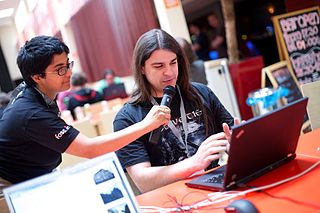149 participants from 31 countries came to Amsterdam in late May to teach each other and improve Wikimedia technology.

Technologists taught and attended sessions on how to write and run a bot, use the new Lua templating language, how to move from Toolserver to the new Wikimedia Labs, design, Wikidata, security, and the basics of Git and Gerrit. Check out the workshops page for slides, tutorials, and other reference material; videorecordings of sessions are due for uploading to Wikimedia Commons soon.
Wikimedia Netherlands, Wikimedia Germany, and the Wikimedia Foundation subsidized travel and accommodation for dozens of participants, enabling the highest participation in this event’s history. As one subsidized participant wrote, “One of the wonderful things about the Wikipedia world is the support given to the volunteers from the different chapters and the parent Wikimedia Foundation to promote community growth and building awesome stuff that the whole world can use….It’s such surprises that makes one love contributing to open source.” Organizers also put together a social events program that included a boat cruise of Amsterdam’s canals.
Participants are still listing what they accomplished or learned during the event, but here’s a sample:
- The Wikimaps project aims to present historical maps on Wikimedia sites, and to work together with OpenStreetMap Historic “to find a common way to model historical geodata” (more details). Maps aficionados discussed the project and made plans in Amsterdam. One volunteer, Arun Ganesh, wrote a prototype wiki atlas: an interactive SVG file that comes with automatic labelling (details).
- Moritz Schubotz, a volunteer, worked on improving search and math functionality in MediaWiki.
- The Foundation testing and quality assurance team improved test coverage and the test environment, and taught other participants how to do QA for Wikimedia.
- Pau Giner, a designer at the Foundation, wrote code to use an SVG for the collapsible section arrow in MediaWiki’s Vector skin. This will make the image less fuzzy-looking.
-

A WMF staffer holds a microphone to amplify a volunteer’s voice during the closing demo session at the Amsterdam hackathon.
User:Ruud Koot wrote a Wikivoyage listing editor that will make it easier to improve the specific parts of a travel suggestion without having to load the whole page. - Several volunteers worked on the account creation tool and process for English Wikipedia, to help the ACC team deal with prospective editors who have not been able to create an account via the web interface. The improved tool (code) streamlines the workflow, helping volunteers do their work faster.
- A group of staffers and volunteers interested in statistical data improved the User Metrics API‘s reliability and security. Another wrote a proof-of-concept MediaWiki extension enabling editors to embed Limn graphs in wiki pages via wikitext.
So far, 90 participants have submitted the post-event survey and results are largely positive, with (of course) several suggestions for improvements in the future. For instance, next year, organizers should help trainers prepare more, and help participants with common interests find and work with each other more easily. We don’t yet know where or when next year’s developer meeting will be, but it’ll happen; subscribe to the low-traffic wikitech-announce mailing list to hear when it’s settled.
You may also wish to read the Wikipedia Signpost report on the event.
Thanks are due to staffers at the Wikimedia Foundation, Wikimedia Netherlands, and Wikimedia Germany who made the event possible, and to volunteers who ran the event, especially lead Maarten Dammers. And thanks to all the participants who gave up their weekend to make our sites better.
Sumana Harihareswara
Engineering Community Manager, Wikimedia Foundation

Can you help us translate this article?
In order for this article to reach as many people as possible we would like your help. Can you translate this article to get the message out?
Start translation